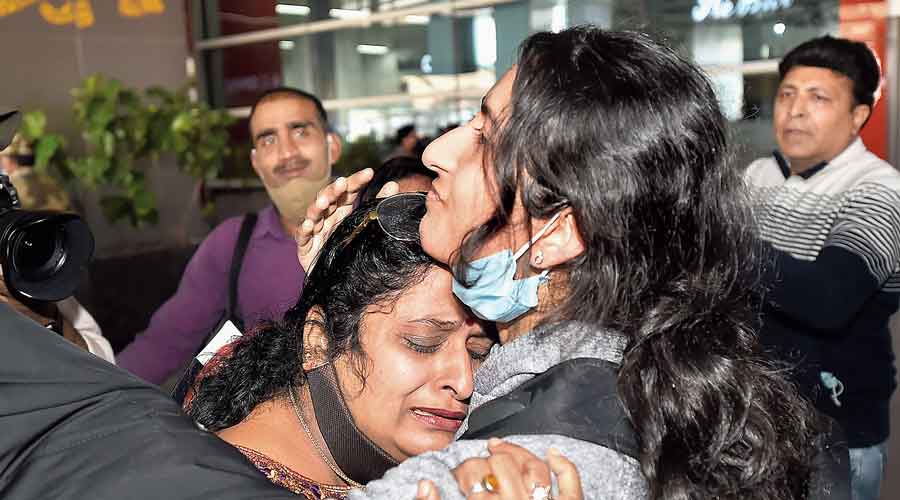An association of Indian doctors who have graduated in medicine overseas has deplored the “false narrative” through which a Union minister has belittled Indians who study medicine abroad, at a time many such students are trapped in the Ukraine conflict.
Union parliamentary affairs minister Pralhad Joshi on Tuesday said that 90 per cent of Indian medics who graduate abroad subsequently fail the Foreign Medical Graduate Examination (FMGE) which they need to clear to be able to register and practise in India.
Members of the All India Foreign Medical Graduate Association (AIFMGA) on Wednesday said that while nearly 80 per cent of the overseas medical graduates indeed failed the FMGE every year, a key reason was the lack of transparency in the exam that they had been protesting for years.
They suggested it was insensitive of the minister to disparage the Indian students and the quality of medical education abroad without reference to the shortcomings of the FMGE.
Joshi was trying to wave away complaints from the parents of the students stranded in Ukraine, among others, that the prohibitive cost of seats in India’s private medical colleges had forced them to send their children to study abroad.
“This is not the time to debate. Ninety per cent of those who come from other countries (with medical degrees) cannot clear our qualification examinations,” Joshi told reporters.
“I don’t intend to create any controversy…. They have gone there, let them do well. That’s all I have to say. But this is not the time to compare the cost (of education) over there and the cost here.”
His comment came at a time Right-wing trolls have attacked the Indian students in Ukraine — including one killed in shelling — for apparently ignoring the Indian government’s advisories, amid complaints that the stranded students have received little help from the Indian mission.
Dr Raghu Ram Nayak, a medical graduate from Ukraine who has cleared the FMGE, said the costs were the main reason Indian students went abroad to study medicine.
While the capitation fee for the entire MBBS course might go well above Rs 1 crore at a private medical college in India, an Indian student can earn the same degree from Ukraine by spending Rs 30-40 lakh in tuition fees and living costs.
Medical colleges in China, Ukraine and Russia are the preferred destination for Indian students. According to a reply in Parliament, some 18,000 Indians are enrolled in Ukraine’s universities, the majority of them being medical students.
However, the medical graduates’ troubles begin when they return to India. The success rate in the FMGE, conducted by the National Board of Examination (NBE), has been just over 20 per cent in the past four years --- and that’s an improvement from previous years.
AIFMGA president Dr Nazeerul Ameen said the FMGE was the only national-level exam that shared neither the question papers nor the answer keys after the test.
“The students deserve to get the question paper and answer keys to know how they performed. Besides, there may be wrong (flawed) questions or wrong answer keys that can be challenged,” Dr Ameen said.
He said the FMGE questions were of postgraduate level. He alleged a “design” to fail the examinees so that medical students were discouraged from going abroad and were forced to “queue up before private (Indian) universities which can charge higher capitation fees”.
Dr Ameen added that the FMGE used to be held only in Delhi till 2014. Now, after repeated protests, it is held in all the state capitals.
The AIFMGA has challenged the lack of transparency in the Supreme Court. Dr Ameen said that thanks to the protests, the pass rate had improved – to 22 per cent in 2021 and 23 per cent in 2020.
“The minister lacks information about the opacity in the FMGE. He should have spoken after analysing the data and the way the test is conducted,” Dr Ameen said.
However, he said, a common National Exit Test will replace the FMGE as well as the final MBBS exam from 2023. This means that final-year Indian medical students and Indian medics with overseas MBBS degrees will take the same test to be able to register and practise.
“We expect greater transparency after the National Exit Test replaces the FMGE,” Dr Ameen said.
An email sent to the NBE seeking its comment on the allegations of opacity in the FMGE has brought no response.










